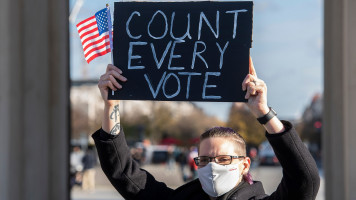2022 saw 15-year high for new naturalised US citizenship
Last year saw the highest number of US naturalised citizens in 15 years, nearly a million, the New York Times reported.
The development comes after more than two years of Covid-19 pandemic restrictions and a previous administration that imposed multiple barriers to different types of immigration.
Former President Donald Trump banned immigration from multiple Muslim-majority countries, made the citizenship test more difficult, and instituted border restrictions using the pretext of the pandemic. On his part, President Joe Biden's administration reversed some of the key obstacles to immigration and citizenship that Trump implemented.
Citizenship is important because it gives people rights that extend beyond residency, namely a permanent legal status that prevents any potential for deportation, and of course gives them the right to vote.
"Until you're a citizen, there's always a risk you can be sent away, even if you're a legal resident," Erin Corcoran, who teaches immigration as an associate professor at the Keough School of Global Affairs at the University of Notre Dame, told The New Arab.
She notes that in some states, foreign residents can be deported for writing back cheques, a sign that their status is always precarious until they obtain citizenship.
Possibly due to the rigorous requirements for obtaining citizenship, which include a civics test, medical clearance and a fee of around US$1,000, naturalised citizens are far more likely to vote.
With public spaces now reopened for naturalisation ceremonies, immigration law firms open for meetings, in-person citizenship tests available, and possibly just as importantly more applicants feeling confident about submitting their paperwork.
"I think there's also a sense for some immigrants that if there's an administration that wants people to naturalise, it would make sense that people would want to naturalise under that administration," Corcoran said.





 Follow the Middle East's top stories in English at The New Arab on Google News
Follow the Middle East's top stories in English at The New Arab on Google News


![Algeciras port [Getty]](/sites/default/files/styles/image_330x185/public/75377010.jpeg?h=327453ef&itok=KfCFUEza)